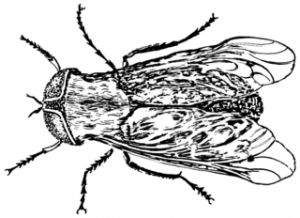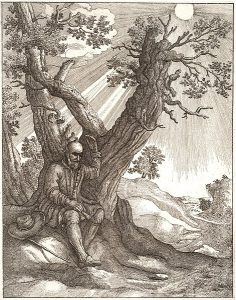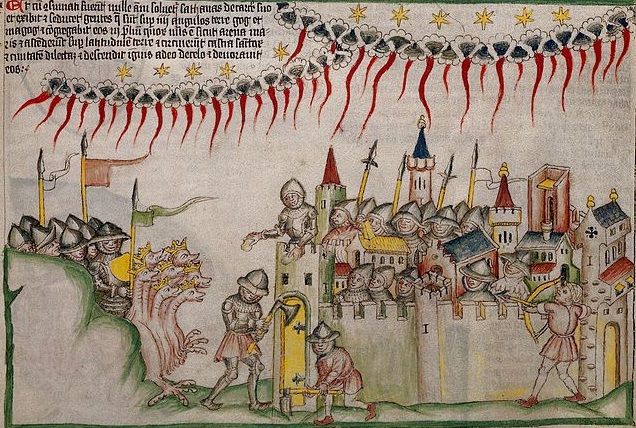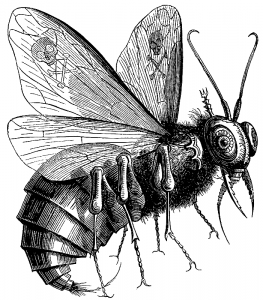I hate flies. Living in a dry climate is helpful, but late in summer the flies start to multiply and collect. They often haunt the windows, banging their disgusting bodies against the glass repeatedly, trying to escape to the outdoors. Flies are carrion creatures, feeding on dead things, excrement and other unmentionable rotting items. They have a role in the ecosystem, I suppose, but not one that I want to personally witness.
Fortunately, most flies don’t bite, but some do. I remember going to Lake Michigan as a child and my brother and I fending off the “horse flies” that attacked any part of me not submerged in the water. Fly bites, while not as itchy as mosquito bites, actually hurt more. I don’t know what the flies were doing, but their blood-sucking plungers must have been higher caliber than the mosquitoes’ delicate straws.
In reading Aesop’s Fables to my children in combination with teaching the Book of Sirach, I came across a theme that I had never noticed before: flies are blood-drinkers! I wondered if this little insight could link up a few disparate concepts in the biblical world, namely, carrion flies, the prohibition on blood-drinking in the OT law, the portrayal of enemies as bloodthirsty and most fun of all the identity of Baal-zebub, “lord of the flies.” Well, let’s try it on for size.
Blood-Drinking Flies in Aesop
 First, Aesop! “The Fox and the Hedgehog” mentions a “swarm of blood-sucking flies,” who are “full of blood” and who plan to “drink up all the blood I have left.” Also, “The Bald Man and the Fly” introduces a controversy between a bald man and a fly who bit his bald head. The bald man derides the fly as one who “live[s] by sucking human blood.” The flea who stars in “The Flea and the Ox” brags about how he lives on human bodies and “drink[s] my fill of their blood.” In “The Bald Man and the Gardener,” the gardener insults the bald man and wishes that flies might “bite you and drink your blood and poop on your head.” I hope that’s enough examples to convince you that flies as blood-drinkers is a common trope in Aesop. I wouldn’t be surprised, if we looked longer and deeper at Greco-Roman literature if we could find many more examples of blood-drinking flies.
First, Aesop! “The Fox and the Hedgehog” mentions a “swarm of blood-sucking flies,” who are “full of blood” and who plan to “drink up all the blood I have left.” Also, “The Bald Man and the Fly” introduces a controversy between a bald man and a fly who bit his bald head. The bald man derides the fly as one who “live[s] by sucking human blood.” The flea who stars in “The Flea and the Ox” brags about how he lives on human bodies and “drink[s] my fill of their blood.” In “The Bald Man and the Gardener,” the gardener insults the bald man and wishes that flies might “bite you and drink your blood and poop on your head.” I hope that’s enough examples to convince you that flies as blood-drinkers is a common trope in Aesop. I wouldn’t be surprised, if we looked longer and deeper at Greco-Roman literature if we could find many more examples of blood-drinking flies.
Blood-Drinking in the Bible (and related literature)

Source: https://commons.wikimedia.org/wiki/File:Judgement_and_first_resurrection_-_The_final_battle_Wellcome_L0029284.jpg
But now, the Bible! Leviticus 17:10 threatens that anyone who “eats blood” will be cut off from the people of God. King David, whose extreme thirst was provided for by a few of his bravest soldiers at the risk of their lives, refuses to drink the water they give to him since it would be tantamount to blood-drinking. Instead, he poured out the water as a libation and said, “Shall I drink the blood of the men who went at the risk of their lives?” (2 Sam 23:17 ESV). This event is memorialized again in the non-biblical 4 Maccabees 3:15, where David “considered it an altogether fearful danger to his soul to dirnk what was regarded as equivalent to blood” (RSV). Also see Josephus, Ant. 7:314. Sirach 12:16 portrays an enemy whose “thirst for blood” is “insatiable.” The nonbiblical 4 Esdras 15:58, describing the sorry plight of sufferers, who “drink their own blood in thirst for water.” Zech 9:15 in the LXX as least in certain manuscripts refers to soldiers who will “drink their blood like wine.” Ezekiel envisions the carrion birds drinking the blood of the dead after the grand battle against Gog and Magog (Ezek 39:17-19). And of course, the Lord turns normal water into blood to make it undrinkable a few times (Exod 7:21; Ps 78:44; Rev 16:6). The nonbiblical Book of Enoch also refers to giants eating people and “drink[ing] the blood” (7:5).
“Men of Bloods”
The Bible also uses a phrase, ish-damim, which literally means “man of bloods.” Usually it is translated as something like “bloodthirsty men.” We see the exact phrase in 2 Sam 16:8 and Ps 5:7. A similar phrase, anashe-damim, “men of bloods,” shows up in Ps 26:9, 55:23, 59:2, and Prov 29:10. The point is that nasty, violent men seek out the blood of other people. You know, kinda like flies! Flies are bloodthirsty and so are violent men.
What about Flies?

Flies show up in the Bible as a divine curse (ha!) sent against the Egyptians in Exodus 8:20-32. They come as a “swarm,” but the text says nothing about blood. The Hebrew word for “fly,” zebub, is only used twice in the Hebrew Bible (Eccl 10:1 and Isa 7:18). However, the term “Baal-Zebub” does show up in 2 Kings 1:2, 3, 6, and 16. This god of Ekron plays a minor role in the narrative of Elijah’s relationship with Ahaziah, but the term underlies the “Beelzebul” who shows up in Jesus’ disputes with the Pharisees as the name of a demon or an alternate term for Satan. “Baal-zebub” means “lord of the flies,” or as the TDOT puts it “lord of filth,” perhaps beacause the offerings which the god consumes are regarded as ritually polluted and therefore disgusting. The term could show up in the fragmentary Qumran text 4Q560. Creepily, the female demon Lilith, Adam’s first wife in Jewish mythology, “could enter the rooms of pregnant women as a fly.”[1] So flies, since they are blood-drinkers, consumers of ritually impure sacrificial offerings, are associated with the demonic.
Conclusions
So now that we’ve taken a look at the biblical texts, Aesop’s fables and a few nonbiblical texts, what kind of portrait can we draw? I think we can offer up a few tentative conclusions:
- Flies were regarded as suspicious, demonic and violent because their habit of drinking human blood.
- Drinking blood was forbidden in biblical law not only because of its associations with magical practices of uniting oneself with an animal’s spirit (the typical explanation), but because it mirrored the carrion activity of flies.
- Violence is regarded as “fly-like” behavior. Violent men, like flies, are “bloodthirsty.”
- Demons, since they also seek to violently destroy human beings, are also “fly-like” in their desire for human blood.
I have to admit I didn’t think that Aesop’s fables would lead me down such a dark and scary path! It does seem like Dracula is staring back at us from what I’ve concluded here. The blood-drinking of vampires then appears “fly-like” and therefore also demonic. The connection between violence, flies, and demons on the basis of blood-drinking now makes more sense to me, but I do think it will give me pause when reading seemingly innocent old tales to my children. Hopefully, we can keep those pesky “horse flies” away!
——————–
[1] Penney, Douglas L, and Michael O Wise. “By the Power of Beelzebub: An Aramaic Incantation Formula from Qumran (4Q560).” Journal of Biblical Literature 113 (1994): 627–50, here 634.
